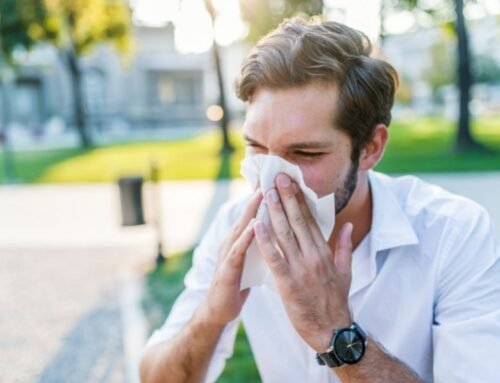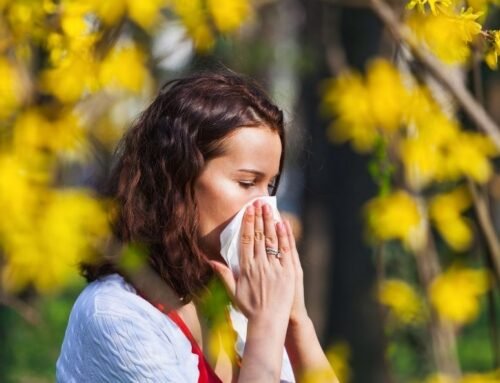With the arrival of the spring season, the pollens that appear can cause complaints of runny nose, sneezing, itching in the eyes or coughing. Patients who has pollen allergy (Seasonal Allergy) know that these complaints will start every season and they try to take precautions. While most of us are happy with the spring season, which begins to make itself felt, it is the months when serious problems begin for people with seasonal allergies. For allergy sufferers, spring season means flying pollen, runny nose, sneezing, red eyes and itching in the eyes, sleepless nights and tiredness that continues for the day.
The most common causes of seasonal allergy are tree, grass and weed pollen. It can also cause seasonal allergies in growing molds in spring.
The emergence of complaints such as runny nose, itching, congestion and sneezing due to the inhalation of pollens in the spring season of allergic people is called allergic rhinitis or hay fever. Springtime pollen can also cause shortness of breath, wheezing, coughing and allergic asthma. It can cause itching, redness and discharge in the eyes and may lead to allergic conjunctivitis. It is seen that pollens cause urticaria in the form of itching and redness on the skin.
Pollen, also known as pollen is actually the breeding seeds of flowers and every year millions of them are released into the environment we live in. They are too small to be seen with the eye. As we know, pollen is spread by wind or bees, insects. The colorful and fragrant plants around us, especially the ornamental plants, are sticky and heavy, and are carried by insects and are not widely found in the air. People with allergic nature can only cause complaints if they get too close to these plants. The patients staying away from these plants prevents the occurrence of complaints.
Pollens, which are important in the formation of pollen allergy that occur in the spring season, are common pollens in the air and spread by wind. Pollen of green plants without flowers is carried by winds. It is not necessary for the patient to be close to these plants, as these pollens can be carried away by the wind for kilometers. Sometimes a tree’s pollen can spread over an area of more than 150 kilometers and affect allergic people within that area. Therefore, it is very difficult to protect. We may not be able to see the trees and plants we are allergic to, but their pollen is in the air. That’s why people with allergic nature say that their complaints increase in windy weather.
How Does Pollen Allergy (Seasonal Allergy) Develop?
Pollen allergy (Seasonal Allergy) affects many people in the world as well as in our country. In some countries, allergic rhinitis due to pollen is seen in one in 5 people. Seasonal allergic asthma attacks and allergic conjunctivitis also affect many people.
Allergic response that occurs in pollen allergy: It occurs with the contribution of environmental factors to an existing genetic predisposition in the person. Allergy is an unwanted, harmful, extreme response of the body’s immune system against substances called allergens such as pollen that enter our body from the external environment.
Pollen is perceived as foreign matter by our body, and due to the extreme response it gives to these foreign substances, nasal discharge, itching, congestion, sneezing, itching in the eyes, and redness occur together.
With the arrival of the spring months, complaints of runny nose, itching, congestion, sneezing, itching in the eyes, and redness begin. Allergic rhinitis complaints increase every year and over time lead to asthma symptoms such as cough, shortness of breath and wheezing.
Spring and autumn are the months when pollen emerges. It is observed that the complaints of the patients who had complaints in the first spring increased in the autumn or especially in the autumn when the pollen of some plants was more intense in the air.
Pollen propagation period of each plant differs. We can separate the pollens emitted from the plants we see in nature as meadow pollens, tree pollens and weed pollens. These pollens every year, even if the climatic conditions change and depending on the plant structure of the region:
- Tree pollen: from February to April
- Meadow pollen: May-July
- Weed pollen: considered to be released into the air in August – October.
Although seasonal allergic complaints vary from country to country depending on the seasonal timing and duration, some climatic factors may cause allergic symptoms to be worse.
Pollen of trees, grass and weeds increases more during cool nights and hot days.
Molds increase rapidly in heat and high humidity.
Pollen levels tend to peak, especially in the morning.
Rainy days remove pollen, but after rainfall, pollen counts may rise again.
On days without wind, airborne allergens remain stuck in the soil. When it is windy and hot, the pollen count increases.
When spring comes, the pollens appear everywhere, and the measures we will take at home and outside can make complaints less.
What are the Symptoms of Pollen Allergy (Seasonal Allergy)?
Pollen allergy, which occurs with the start of the spring season, can cause many more problems with allergic rhinitis and asthma. Especially in patients who have been allergic to pollen for many years, many complaints arise due to damage to other organs.
What are these:
- Nasal discharge is especially said by patients as sputum that does not end in the back of the throat.
- Cough occurs over time with nasal discharge in patients whose complaints continue for many years.
- Fatigue is one of the most important complaints in patients whose sleep patterns are disturbed.
- Nasal bleeding can be seen as a result of damage to the nose.
- Learning difficulties are more common in many patients with concentration disorder, especially in childhood.
- Eye watering, itching and conjunctivitis develop due to the damage caused by the allergy in and around the eye.
- Frequent sinusitis is due to damage to the sinuses with allergic rhinitis in the respiratory tract.
- Bad breath is always accompanied by nasal discharge, especially in patients who breathe through the mouth at night.
- A decrease in hearing is associated with allergic rhinitis due to the damage done by the allergy to the ear.
- Taste and smell disorder is seen with nasal congestion.
- Itching in the throat and frequent pharyngitis also develop due to mouth breathing.
- Tooth decay is more common in adults as well as in childhood, due to mouth breathing.
- Shortness of breath and wheezing are seen when asthma complaints begin due to allergic rhinitis affecting the lower airways.
- Snoring is one of the common complaints especially in patients who breathe through the mouth at night. In the following years, we may encounter with stopping breathing during sleep.
These complaints due to pollen in spring may continue all year over time. Asthma develops more easily in people with year-round allergic complaints. It should not be forgotten that patients who are sensitive to pollen may also develop sensitivity to allergens such as house dust, mold and cat and dog over time.
The diagnosis and treatment of seasonal allergy prevents the development of other complaints that may arise. Seasonal pollen allergy should be diagnosed and treated by allergists.The diagnosis and treatment of seasonal allergy prevents the development of other complaints that may arise. Seasonal pollen allergy should be diagnosed and treated by allergists.
What to Do If You Have Pollen Allergy (Seasonal Allergy)?
With the emergence of pollen in the spring, if there is runny nose, itching, congestion, sneezing, cough, shortness of breath, wheezing or itching in the eyes, redness, pollen allergy should come to our mind.
Adult patients with symptoms of pollen allergy should go to an allergist. If you have symptoms of pollen allergy, allergy tests should be done to make a diagnosis.
Pollen allergy, which is one of the allergic diseases, is effective on many organs as in other diseases. When the complaints of nasal discharge, congestion, sneezing begin, ENT physicians are often visited, but the disease is not limited to the nose and throat. Ophthalmologists visit when there is irritation in the eyes, but the allergy will not be limited to our eyes. When shortness of breath develops, wheezing is followed by the diagnosis of asthma, by chest diseases or by dermatology for accompanying eczema atopic dermatitis complaints. That is why it is very important for allergic diseases to be diagnosed and treated by allergy specialists.
As with all allergic diseases, if the correct diagnosis is made, the symptoms of pollen allergy can be controlled with the right drugs and many physicians do not need to be visited. Allergists find out which allergens they are allergic to and how to treat them, and whether allergy vaccination is needed.
If You Have Pollen Allergy (Seasonal Allergy), How Should We Prepare When Going To The Doctor?
With the emergence of pollen in the spring season, if you have nasal discharge, itching, congestion and sneezing complaints, it is necessary to reveal whether these complaints are allergic or not. If you have decided to go to the allergy doctor for the diagnosis of your complaints compatible with pollen allergy, we will try to give information about how to prepare.
Should I go to an allergist for pollen allergy?
Allergy specialists are doctors who are very experienced in the diagnosis of pollen allergy along with other allergic diseases and are also internal diseases specialists who receive special training in this field. For this reason, it is beneficial to visit an allergist if possible.
When you go to allergists, you will be diagnosed whether your complaints are allergic or if they are related to other diseases. For example, these complaints of some of the patients with nasal obstruction may be due to the underactive thyroid gland (hypothyroidism). The importance of the need to treat thyroid-related disease is to be explained. Allergists are also internal medicine specialists.
For Seasonal Allergic Rhinitis, You Should Stop Certain Medications Before Visiting a Doctor
If you have decided to go to a doctor for pollen allergy, and if possible, you should stop using allergy medications, cough and cold medicines, some antidepressants, especially antihistamines. For the diagnosis of Pollen Allergy, an allergy test may be required, and unfortunately these drugs will affect the results of the allergy test, and these drugs should be discontinued at least 1 week before by asking the doctor. Nasal sprays and breath-opening sprays do not affect the allergy test. It does not need to be stopped. In addition, you do not need to stop the blood pressure medications, thyroid or diabetes medications used by the patient for your other diseases. If you are using antibiotics, you do not need to stop.
No Need to be Hungry
Generally, there is no need to go hungry for the tests required for the diagnosis of Pollen Allergy. For this reason, it is beneficial to come by having breakfast.
How Is Pollen Allergy (Seasonal Allergy) Diagnosed?
Pollen allergy, which starts with the spring season in adults, is a serious health problem that affects both the health and social life of the people and disrupts the quality of life. Pollen allergy is not only in the form of nasal discharge, itching, congestion and sneezing, but unfortunately, it brings other health problems in the future. Adults with Pollen Allergy need allergy tests to be diagnosed. We tried to answer what needs to be done for the diagnosis of pollen allergy and how the tests will be done for you.






